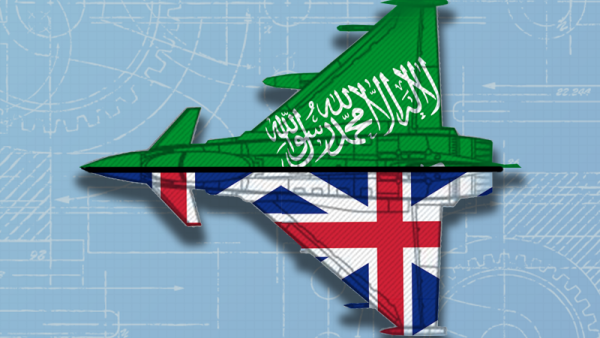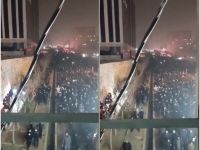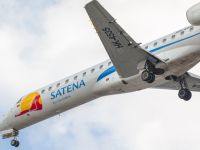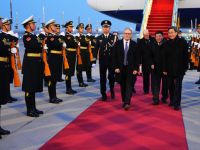- Saudi crown prince Mohammad bin Salman has purchased 48 more jets from the U.K.
- The military alliance between both countries dates back decades
- The U.K.'s BAE Systems has consistently, and at times corruptly, supported Saudi
- Theresa May is just the latest Prime Minister to bend to the will of Saudi
By Ty Joplin
Saudi crown prince Mohammad bin Salman recently concluded his visit to the United Kingdom as part of his world tour introducing himself as the de facto leader of Saudi. Although bin Salman sought to unveil a ‘new and improved’ Saudi Arabia to the West, he was met by demonstrations in London calling him a war criminal.
Theresa May, in response to the growing outcries against the U.K’s participation in bin Salman’s ongoing war in Yemen, promised to bring up the humanitarian concerns to her Saudi counterpart. However, the U.K’s strategic alliance with Saudi runs deep, and is one of their most lucrative ones. The U.K. has already supplied Saudi with armaments it undoubtedly knows will be used against civilians, and has continued to send weapons to Saudi.
A new deal to deliver 48 more fighter jets to Saudi has been agreed upon and is currently in the works.
Fighter Jets and Slush Funds
Yearly value of arms deals from U.K. to Saudi from 2008 to 2017 (Rami Khoury/Al Bawaba)
Saudi Arabia is the U.K.’s top destination for arms exports, with over $15 billion delivered in jets, weapons, bombs and other equipment from 2008 to 2017. The amount the U.K. provides in weapons to Saudi has no regional equivalent: the closest is the UAE, with $10 billion in armaments received from the U.K. The amount of armaments dramatically increased following bin Salman’s intervention into Yemen.
Both Saudi and the UAE are currently involved in a military intervention into Yemen to oust the Iran-backed Houthi militia from the country. But much of Saudi’s weapons have come from a long-running, multi-staged weapons deal between the U.K. and Saudi dating back to 1985.
The deal, nicknamed Al Yammah, or the dove, is one of the biggest the U.K. has ever negotiated, reportedly netting the U.K.-based arms company, BAE Systems, over $60,000. The Guardian reported that the ongoing deals between Saudi and the U.K. provide BAE Systems with anywhere from about $2 billion, or about 12 to 25 percent, of its annual profits.
Much of the arms deals have revolved around military warplanes: specifically Eurofighter Typhoon jets, which have been bought en masse by Saudi to enhance and maintain a formidable air force capable of dominating the region’s airspace.
In 2005, BAE Systems and Saudi agreed to a deal to deliver 72 Eurofighter Typhoon jets to Saudi, though it was held up for several years. Finally, just months before bin Salman ordered the military intervention and occupation of Yemen in 2015, one of the first batches of jets were shipped to Saudi.
The Yammah arms deal has also been drowned in corruption, with U.K. police estimating at one point that over eight billion dollars has been used to pay corrupt commissions, middlemen, and otherwise grease the deal.
Initially negotiated between former prime minister Margaret Thatcher and a Saudi prince by the name of Bandar bin Sultan Al Saud, Bandar reportedly received payments totalling over $30 million to his accounts.
Many of the payments were funneled by BAE Systems to an offshore company called Poseidon: investigators estimated that about $1.3 billion went to Saudi officials through Poseidon.
Another Saudi royal involved in the Yammah arms deal, prince Turki bin Nasser, took a piece of the Yammah arms deal pie. To ensure negotiations kept going smoothly, BAE Systems raised a $60 million slush fund, mostly designed to keep bin Nasser happy while on visits to Europe.
When asked about the allegations of massive corruption that were endemic to the arms deal, Bandar had this to say: "If you tell me that building this whole country ... out of $400 billion, that we misused, or got, $50 billion, I'll tell you, 'Yes. So what?'”
Greasing the Deal
BAE Systems (AFP/FILE)
However nonchalant Bandar was about the corrupt nature of the U.K-Saudi arms deal, investigations into the deal were virulently shot down by Saudi and BAE Systems.
When the U.K.’s Serious Fraud Office got wind of slush funds being created by BAE Systems for Saudi royals to enjoy themselves, they began their investigations into the deal. Immediately, they faced pressure from both Saudi and BAE Systems.
“Everybody wanted it [the inquiry] to go away,” one source told The Financial Times.
At one point, Saudi officials secretly warned the U.K. government that they would make it easier for extremists to target the U.K., saying they would face "another 7/7" and the loss of "British lives on British streets,” if the investigation continued.
BAE ran an intense media and lobbying campaign to end the investigation, saying that Saudi would walk away from the deal if it scrutiny got too intense. In 2006, the U.K. government caved, and former prime minister Tony Blair announced his government would cease all inquiries into the alleged corruption taking place behind closed doors:
"Our relationship with Saudi Arabia is vitally important for our country in terms of counter-terrorism, in terms of the broader Middle East, in terms of helping in respect of Israel and Palestine. That strategic interest comes first."
- Techwashing: Saudi Arabia’s new ‘Megacity’ Dream Will Actually be an Ethical Nightmare
- Saudi Arabia is Playing Political Hardball, But Jordan Stands in the Way
In other words, no matter how much corruption is hidden inside the BAE’s dealings with Saudi, it is not worth it to reveal that if it means Saudi will leave the negotiating table.
Once the SFO shut down its investigation, the U.S.’ Department of Justice (DOJ) began its own investigation into the corruption behind Al Yammah, since some of the money was funneled through U.S. banks. In March 2010, BAE peld guilty and agreed to pay a fine of $400 million, one of the biggest issued by the DOJ.
But that hasn’t stopped the close working relationship between the U.K and Saudi to prosper via BAE.
Who Is at the Losing End of the Deal?
A man walks amid rubble in Yemen (AFP/FILE)
On bin Salman’s last day in the U.K., a deal to provide 48 more Eurofighter Typhoon jets to Saudi was approved. The deal will greatly enhance Saudi’s air capabilities in order for it to maintain its stranglehold over Yemen and worsen the country’s humanitarian situation.
However, U.K. Prime Minister Theresa May, hoping to show her country is concerned about helping developing nations, announced the formation of a $138 million aid partnership with Saudi.
To this, peace and arms control monitoring groups are un-moved. “The last week has shown how low the UK government is willing to sink in order to sell arms to the Saudi regime,” Andrew Smith of the U.K.-based Campaign Against Arms Trade told Al Bawaba.
“We welcome any aid that is reaching and helping people in need, but much of that is being undone by the arms sales, which will only fuel greater instability and conflict. The Saudi regime has one of the worst human rights records in the world. It's time for the UK government to stop putting arms sales ahead of human rights."
Thanks to the U.K.-made jets Saudi had received, it was able to relentlessly bomb Yemen’s airports and agricultural infrastructure, simultaneously crippling the country’s ability to support itself while making it totally reliant on imports for food, water, fuel and medicine. Saudi then enforced a naval blockade on the country, putting over 8 million on the brink of famine and over 22 million, the vast majority of the country, in need of humanitarian assistance.







